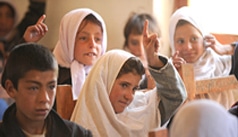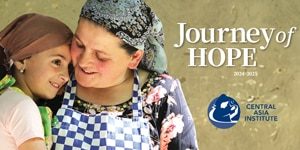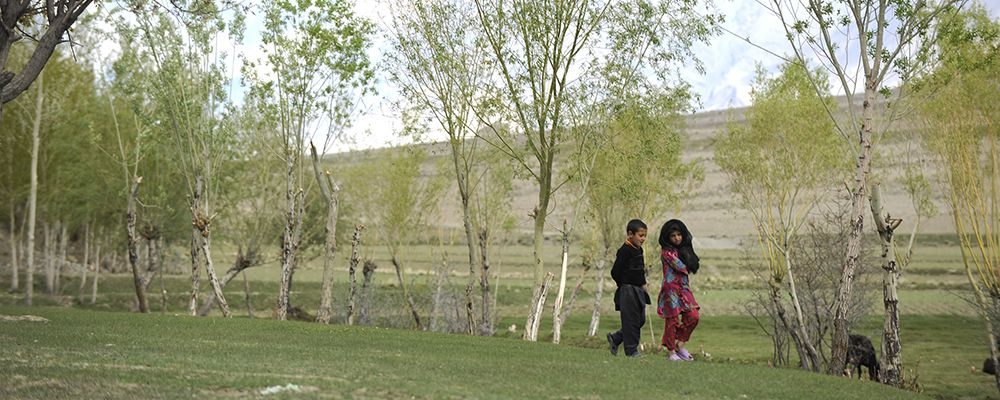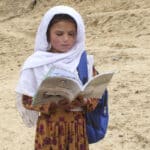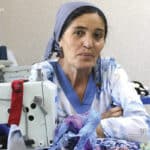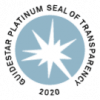Field Report: CAI’s new Director of International Programs makes it personal
Traveling to the field makes all the difference
If you’ve read Three Cups of Tea, you’re aware that Central Asia Institute was founded on the belief that sitting down with people and drinking tea together is the essential first step to accomplishing great things. Without those face-to-face exchanges, change is nearly impossible in that part of the world. Relationships of trust must be built before plans can be drawn for a new school, a teacher receives training, or a child walks into a classroom to begin her education.
In the spirit of our founding philosophy, Robert (Bob) Thelen, Central Asia Institute’s new director of international programs, journeyed to Afghanistan and Tajikistan in November to meet with our partners, visit schools, and listen and learn from our colleagues on the ground and the people we serve. Bob is a veteran to international development work. He’s lived and worked abroad for a good share of his career including three years with an international non-government organization (NGO) in Afghanistan.
Despite his familiarity with the region, the trip this fall had its share of adventure, beginning with the flight from Kabul into Ishkashim district, a remote province in the mountains of northern Afghanistan.
“We couldn’t travel by ground because the roads aren’t secure. There’s a commercial flight, but that’s also not safe. So we flew in a six-seater plane run by a company that flies NGO staff into hard-to-access locations. I sat in the co-pilot seat with oxygen tubes in my nose – we all had them in case the pilot needed to fly higher to avoid turbulence over the mountains. We landed on a short and bumpy dirt runway. There’s only one flight a week.” The time and risks involved in the journey underscored for Bob why support from Central Asia Institute is so needed. “These are places that don’t get a lot of attention from the central government or the international community because they’re so remote and marginalized.”
During his week in Ishkashim, Bob had the opportunity to visit numerous projects that Central Asia Institute is supporting. This included a school that CAI is helping to rebuild as well as classes in schools that are fully operational. He traveled over rough, winding roads to a community near the Pakistani border where he met with local leaders and toured the schools that are receiving CAI support. Trained as an engineer, Bob brainstormed with the crew about ways to improve construction techniques and how to source more durable materials despite the challenges in getting materials to these hard-to-reach villages. Through his hands-on approach and by helping to build local capacity, Bob felt he was able to win the trust and respect of the local villagers. His engineering expertise also came in handy in allowing him to assess both completed as well as future projects in the field.
One of the highlights of the trip was an invitation from the district governor of Ishkashim to attend a Buzkashi match. Buzkashi is a Central Asian sport in which horse-mounted players attempt to place a goat or calf carcass in a goal. While sitting together watching the matches, the two were able to deepen their relationship through the camaraderie that develops over a shared experience. Bob was struck by the governor’s compassion for the people in his province. Most of them live in harsh conditions and are extremely poor. In addition to better access to schools and healthcare, the governor would like to give his people access to cultural activities that would bring them an afternoon or evening of happiness and comfort in a life fraught with hardship.
Prior to visiting Ishkashim, Bob spent a week in Kabul, meeting with staff from Central Asia Institute’s local partner, Shining Star Educational Organization of Afghanistan (SEEOA). He also met with folks from like-minded NGOs to discuss the country’s biggest needs in terms of education, where and what types of programs are needed most, and how to ensure no overlap in services. He confirmed that community-based education and Early Childhood Development programs are big priorities, and align perfectly with the mission of Central Asia Institute.

Before flying back to the States, Bob crossed the border into Tajikistan to meet with CAI’s local partner, Central Asia Institute Tajikistan (CAIT), visit school construction projects and meet with education leaders to discuss needed repairs and additions to schools in the area. A highlight of his time in Tajikistan was the visit to an Early Childhood Development program supported by CAIT. The team arrived during naptime. Standing in the doorway, they watched the little ones, wide awake in their beds, peeking over their blankets to see the strangers who had come to visit. One little boy stood without saying a word, walked up to a member of CAIT’s staff who was standing next to Bob and took her hand, figuring she’d know exactly what he needed: a visit to the bathroom.
We asked Bob if Afghanistan felt different to him this time around. “Unfortunately, the security situation has only gotten worse since 2014 [when I last worked in country], especially in Kabul. Having to travel around in an armored vehicle was not only a scary reality check of just how dangerous the situation has become, but logistically challenging as well.
“But seeing first-hand and up close the people who Central Asia Institute is supporting – meeting the students and teachers who are so eager for education and are so grateful for the chance at a better life – it was well worth it!” Bob also felt the trip was invaluable in terms of building personal relationships that are so vital to ensuring progress. “The building blocks of trust are in place. They know who I am. And it helps that the communication technology has improved exponentially since I last worked in the region. Now that we’ve made the personal connection, tools like Skype, What’s App, and email make it possible to continue to support our partners on the ground from the other side of the world.”
Children at Khunkot School in northern Afghanistan welcome Bob with a song.
Bob plans to travel to the region three or four times a year. “You can’t beat a face-to-face meeting for impact,” he said. “Personal exchanges help to initiate change, which is what’s needed to get to greater capacity.” CAI’s staff back in Bozeman couldn’t be more pleased with the information, personal stories, and photos that Bob came home with and which are so essential to demonstrating our impact. This coming spring, once the snow melts in these mountainous corners of Central Asia, schools reopen, and roads are passable again, Bob will be back on the road. Stay tuned for more stories from the field.
